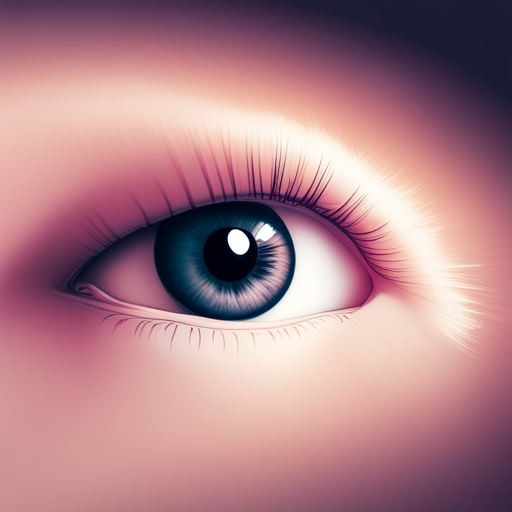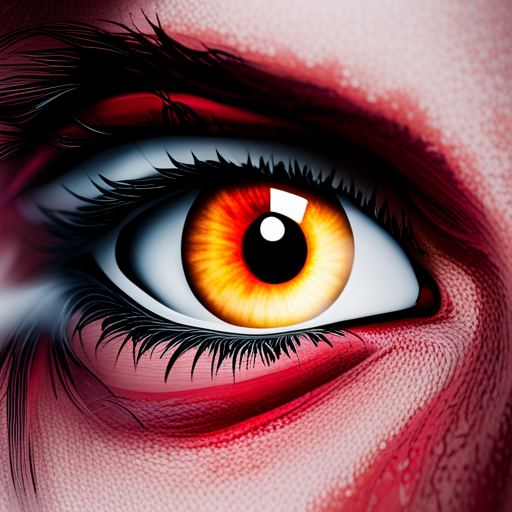While candle gazing can promote relaxation and create a calming atmosphere, burning candles can release harmful substances into the air, affecting your indoor air quality and potentially triggering respiratory issues.
Additionally, caution should be taken when blowing out candles to avoid burning your cornea with hot wax.
This article will explore the potential eye health risks associated with candle use and provide tips on how to minimize any negative effects.
Key Takeaways
– UV rays, specifically UV-A and UV-B, can cause long-term damage to your vision.
– Blue light can lead to macular degeneration and disrupt your sleep.
– Staring at the sun or using sunglasses can help block out UV rays.
– Avoiding blue light before bed can promote better sleep.
Potential Eye Health Risks Associated With Candle Gazing

https://www.youtube.com/watch?v=0-ZgpVlX_YI
Staring at a candle for extended periods of time can potentially pose risks to your eye health. The intense and direct light emitted by the flame can strain your eyes, leading to discomfort and fatigue. The flickering nature of the flame can also cause your eyes to constantly adjust, putting extra stress on your vision.
Additionally, if you accidentally get hot wax in your eyes while blowing out the candle, it can cause irritation and potential damage to your cornea. It is important to exercise caution and avoid prolonged staring at candles to protect your eye health.
If you experience any persistent discomfort or vision problems after candle gazing, it is recommended to seek medical attention for proper evaluation and treatment.
How Harmful Light From Candles Can Affect Your Vision

To protect your vision, it is important to be aware of how harmful light emitted by candles can affect your eyes. Here are three key ways:
1. Blue light: Candle flames emit a small amount of blue light, which can cause long-term damage to your vision and disrupt your sleep. This can lead to eye strain, fatigue, and even macular degeneration.
2. UV rays: Although candles do not emit significant amounts of UV rays, it’s still important to note that prolonged exposure to UV rays can be harmful to your eyes. Protecting your eyes by wearing sunglasses or avoiding staring directly at the candle flame can help minimize the risk.
3. Indoor air quality: Burning candles release particulate matter and volatile organic compounds (VOCs) into the air. These can irritate your eyes and affect your overall eye health. Proper ventilation and choosing natural candles made from soy or beeswax can help reduce exposure to these harmful substances.
The Benefits of Candlelight for Relaxation and Sleep

When you relax in the warm glow of candlelight, your body and mind can unwind, promoting relaxation and better sleep. Candlelight has been used for centuries as a tool for creating a calming and soothing atmosphere. But did you know that candle gazing can also have benefits for your eyes?
| Benefits of Candle Gazing | Negative Effects of Lighting Candles |
|---|---|
| Provides a low, warm light that promotes relaxation | Releases particulate matter into the air |
| Strengthens eye muscles and improves focus | Produces volatile organic compounds (VOCs) |
| Boosts mood, with lavender being excellent for relaxation | Some fragrances can trigger asthma or cause respiratory issues |
| Can help in mindfulness and meditation practices | Switching to naturally made candles can reduce exposure to chemicals |
| Unlikely to improve your vision but can help with focus | Proper ventilation can minimize negative effects |
| Some fragrances can irritate eyes if allergic | |
| Not regarded as bad for health but can cause allergic reactions |
Understanding the Negative Effects of Burning Candles on Eye Health

Burning candles can release particulate matter and volatile organic compounds (VOCs) into the air, which can negatively impact the health of your eyes. Here are three reasons why you should be cautious:
1. Allergies: Fragrances in scented candles can trigger allergies and cause respiratory issues. If you are allergic to the fragrance, it can irritate your eyes and lead to discomfort.
2. Chemical exposure: Some fragrances in candles are made synthetically and can release harmful chemicals into the air. This can further irritate your eyes and affect your overall health.
3. Indoor air quality: Burning candles can decrease indoor air quality due to the release of particulate matter and VOCs. Proper ventilation is crucial to minimize the negative effects on your eyes and respiratory system.
It’s important to be aware of these potential risks and take necessary precautions to protect your eye health while enjoying the ambiance of candlelight.
Candle Wax and Eye Safety Measures

Blowing out candles with caution can help prevent hot wax from potentially burning your cornea. When blowing out candles, it’s important to keep your eyes protected to avoid any wax flying into them. Taking this simple safety measure can save you from potential discomfort or vision problems. Here are some tips to ensure eye safety when dealing with candles:
| Eye Safety Measures |
| 1. Always cover your eyes with your hand or a cloth while blowing out candles. |
| 2. Make sure to position yourself at a safe distance from the candle to avoid any splattering wax. |
| 3. Avoid blowing out candles in a windy environment as it increases the chances of wax getting into your eyes. |
| 4. If wax does come into contact with your eyes, blink several times and check your vision for any damage. |
| 5. If you experience persistent discomfort or vision problems, seek medical attention. |
Allergic Reactions and Eye Irritation From Scented Candles

To prevent allergic reactions and eye irritation, it’s important to be mindful of the fragrances in scented candles. Here are three reasons why:
1. Synthetic Fragrances: Some scented candles contain synthetic fragrances that can release chemicals into the air. These chemicals can irritate your eyes and potentially trigger allergic reactions. Being aware of the ingredients in scented candles can help you avoid these harmful fragrances.
2. Respiratory Issues: Certain fragrances in scented candles can also cause respiratory issues, especially for individuals with asthma. Breathing in these fragrances can lead to coughing, wheezing, and difficulty breathing. By choosing candles with natural fragrances or opting for unscented candles, you can reduce the risk of irritating your eyes and respiratory system.
3. Allergic Reactions: If you are allergic to certain fragrances, exposure to scented candles can cause allergic reactions such as redness, itching, and swelling of the eyes. It’s essential to identify any allergies you may have and avoid candles with fragrances that trigger these reactions.
Synthetic Fragrances in Candles and Their Impact on Eye Health

Using scented candles with synthetic fragrances can potentially harm your eye health. Synthetic fragrances in candles may contain chemicals that can irritate your eyes, especially if you’re allergic to the fragrance. When these candles are burned, they release particulate matter and volatile organic compounds (VOCs) into the air, which can affect indoor air quality and potentially trigger respiratory issues.
It’s important to note that scented candles are not regarded as bad for your overall health, but they can cause allergic reactions and eye irritation in some individuals. To minimize the risk, consider switching to naturally made candles from soy or beeswax, which have lower concentrations of chemicals.
Additionally, ensuring proper ventilation when burning candles and seeking medical attention if you experience persistent discomfort or vision problems are important steps to protect your eye health.
When to Seek Medical Attention for Candle-Related Eye Discomfort

If you experience persistent discomfort or vision problems after being around candles, it is important to seek medical attention. Your eyes are precious, and any issues should be taken seriously.
Here are three reasons why seeking medical help is crucial:
1. Prompt diagnosis: Only a qualified medical professional can accurately diagnose the cause of your discomfort or vision problems. They can determine if it is related to the candles or if there is an underlying condition that needs attention.
2. Prevent further damage: Ignoring the symptoms can lead to worsening of the condition or potential long-term damage. Seeking medical attention early can help prevent any complications and ensure proper treatment.
3. Peace of mind: By consulting a medical professional, you can get reassurance and peace of mind about your eye health. They can provide guidance, advice, and appropriate treatment to help alleviate your discomfort and address any vision problems.
Can Black Soot from Candles Cause Eye Damage?
The science behind black candles reveals that burning them can release black soot which may contain harmful chemicals. Prolonged exposure to this soot can potentially irritate the eyes and cause damage. It’s important to use candles in well-ventilated areas and keep wicks trimmed to minimize the risk.
Frequently Asked Questions
Can Staring at a Candle for Too Long Cause Permanent Damage to Your Eyes?
Staring at a candle for too long is unlikely to cause permanent damage to your eyes. However, it’s important to exercise caution to prevent wax from flying into your eyes and seek medical attention if you experience discomfort or vision problems.
Are Scented Candles More Likely to Irritate Your Eyes Compared to Unscented Candles?
Scented candles are more likely to irritate your eyes compared to unscented candles. Some fragrances in scented candles can trigger asthma or cause respiratory issues, potentially leading to eye irritation.
Can the Smoke Released From Burning Candles Affect Your Eye Health?
Yes, the smoke released from burning candles can affect your eye health. It may cause irritation or discomfort, especially if you have sensitivities or allergies. Taking precautions like proper ventilation can help minimize the negative effects.
Are There Any Specific Candle Waxes That Are Safer for Your Eyes Than Others?
There aren’t specific candle waxes that are safer for your eyes than others. However, if wax gets in your eye, blink several times and check for any damage. Seek medical attention if needed.
Can Blowing Out Candles Without Caution Pose a Risk to Your Eye Health?
Blowing out candles without caution can pose a risk to your eye health. Hot wax can potentially burn your cornea, so exercise caution. Keep your eyes covered to prevent wax from flying into them.

